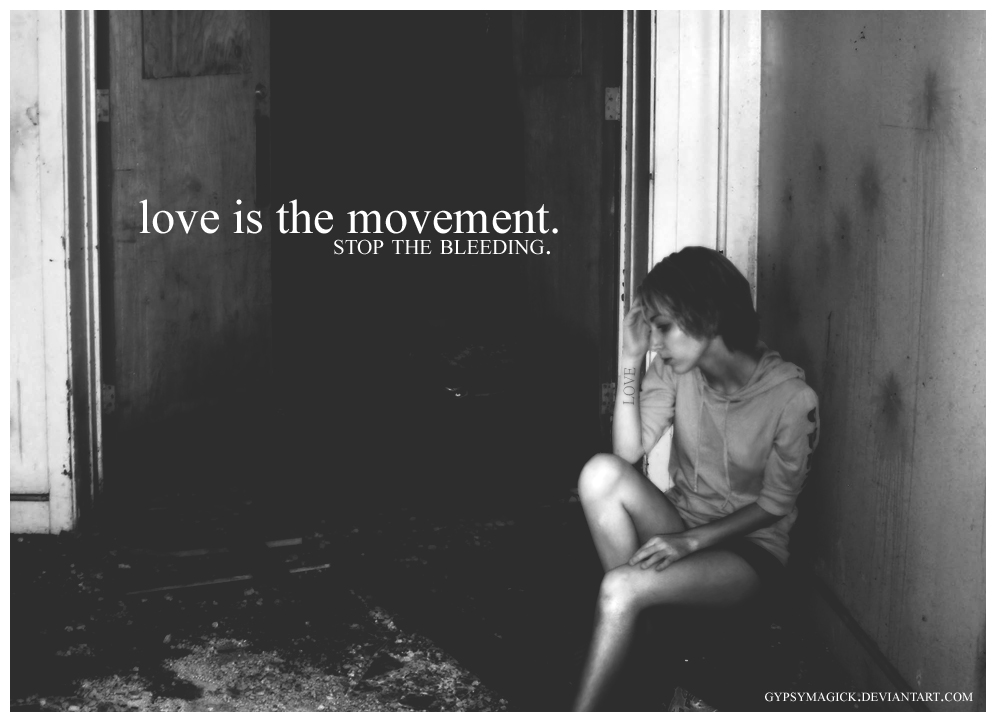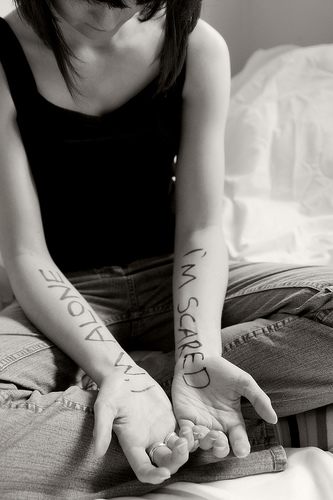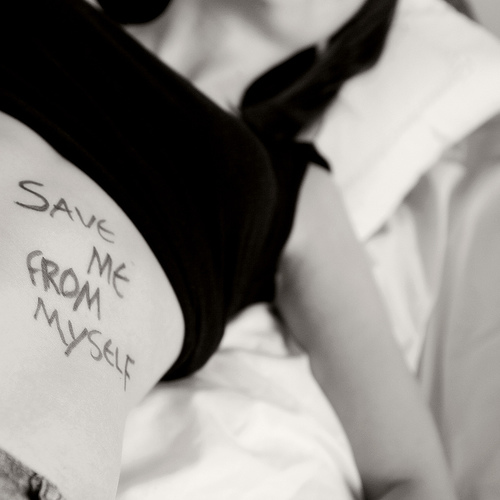October 19th, 2008
Angelina Jolie did it—so did Johnny Depp and Princess Diana. According to recent research studies, between 10-20 percent of college students do it too. Self-injury is an increasing phenomenon in today’s young adult culture, but it’s often misunderstood.
According to the Mayo Clinic, the majority of those who self-injure are adolescents. Risk factors include depression, anxiety disorders, substance abuse disorders, eating disorders, and other mental health conditions. Victims of childhood trauma are especially likely to self-injure—those haunted by neglect or abuse often have an impaired ability to control their emotions and behavior.
A common misperception of self-injury is that those who commit it are suicidal. In reality, those who harm themselves are usually not trying to kill themselves, but instead trying to hold their lives together. Everyone has coping mechanisms to let out feelings of hurt, anger, and frustration: some go for a run, some write in their journal, and some throw a temper tantrum. Others, in silent secrecy, choose to take a blade to their skin. The sight of blood swirling down the drain can be as therapeutic to a cutter as a deep tissue massage; and the phrase, “it hurts so good” takes on a new, much more disturbing meaning.
There are many reasons that those who self-injure choose to hurt themselves. In her book A Bright Red Scream, Marilyn Strong writes that self-injury often occurs when the perpetrator feels abandoned or alone. The feelings build until they are unmanageable, and then the act is committed and dissociation is attained. Dissociation is commonly described as a feeling of numbness, a sensation of separation from one’s body. Unable to cope with the chaotic emotions they are experiencing, self-injurers use dissociation to distance themselves from the pain of reality.
A completely opposite motive for self-injury is the feeling of life it brings. Some who cut themselves report that the sight and sensation of bleeding is the only way to prove that they are still alive. For those who are depressed, the pulsating red release can be the sole sign of life in an otherwise gray existence. Some cutters feel that the blood is a symbol of the negative feelings or impurities inside their bodies. By cutting, they are letting the bad blood escape. This idea echoes the historical method of using leeches and bloodletting to cure ailments: once the evil has been evicted, the body can be pure and healthy.
Self-injury can also grant a feeling of power or control. People who have had many of their freedoms and choices taken away turn to the one thing they can control—their bodies. It is interesting, though not surprising, that many women who suffer from eating disorders also self-injure. Both disorders can stem from the need to maintain whatever control they can in a world of perceived powerlessness. In a study published in the American Journal of Psychiatry by Drs. Winchel and Stanley, 35 percent of anorexics and 39 percent of bulimics reported self-injuring.
In the end, self-injury can be a cry for help. While most self-injurer hide their wounds, some are also hoping that someone notices their silent suffrage. Scars, usually on the arms, legs, and torso, may casually flicker in and out of sight. Unable to express emotion in conventional ways, some resort to their bodies as their medium of communication.
The scars left from self-injury can be viewed as burdens or battle wounds. Some self-injurers try to erase their scars with creams or surgical procedures so they can forget their bloody past. Others view their scars as life markers too important to disregard.
While cutting is one of the most well known modes of self-injury, numerous others exist. Other methods include carving, burning, hitting, pulling out hair, biting, and many more. According to the Mayo Clinic, scars, injuries, bruises, frequent “accidents”, the constant carrying of sharp objects (knives and razors, but also paper clips, pins, or pieces of jagged metal), and wearing long sleeves and pants even in hot weather are signs of self-injury.
If someone reveals that they self-injure, or have done so in the past, it’s important to remain supportive. If they are willing to talk, be willing to listen without judgment. Self-injury is unsettlingly common –it occurs in somewhere between 1 in 10 and 1 in 5 college students, and some studies suggest it’s even more frequent than that. By increasing awareness and understanding of the phenomenon, society can give a voice to those who carry silvery secrets and facilitate outward expression rather than inward aggression.
[taken from The Wake]
University of Minnesota Student Magazine































 To deal with unbearable emotions.
To deal with unbearable emotions.







This one goes out to Daisy who posted on the 5th December 2007.
I hope she sees it.
Daisy, you giving into temptation doesn't make you weak and dumb. I harm mainly for the same reasons as yourself. You feel the need to convert your emotional pain to physical pain where you can truly feel it (at least, that is what I understood from your comment).
I think you should find someone to talk to - be it a good counsellor, a relative or a friend/boyfriend/girlfriend that you can talk openly too, cry in front of, show them the things you've done and trust them with your life - know that they won't tell a soul on this planet unless you tell them to.
OR find a site (such as this one) where you can post regularly and have people try to help you. Sometimes not knowing someone very well makes it easier because they can't tell anyone you know.
As for things at school (i don't know where you live but where I am we have uniforms) but if it is a school where you wear your own clothes and people are saying things about your style - forget them they're scared of what is different from them. If they are saying anything about you at all FORGET THEM! Chances are what they say isn't true. Instead walk right by with your head held high, don't let them see that it gets to you otherwise - they'll keep at you. If it does just try your best not to let it show and they might stop. (if that's the case) If that isn't well I've tried to help you.
This has been long especially as I literally just found this website.
Take care Daisy and try to find someone you can talk to. It really, really helps knowing that you can open up to someone. Anytime you feel the urge to hurt yourself you should try to talk to that someone that I hope you find and can trust.
A lot of this advice goes to anyone in general. Giving into temptation does not make you weak or dumb or stupid! Don't let any one's words affect you and change who you are. Remember - people are only scared of what's different, what's unique and what's extraordinary! Don't let them make you scared of yourself for being a brilliant person.
I hope this (very long!) comment hopes at least one person out there. If it does I'd be ever so happy to know I've helped someone.
Hugs to all those that need/want them =] Be strong and never lose sight of goals you have in life - no matter what.
The people that run this site are doing a brilliant job. Keep it up!
AJ
XoXo